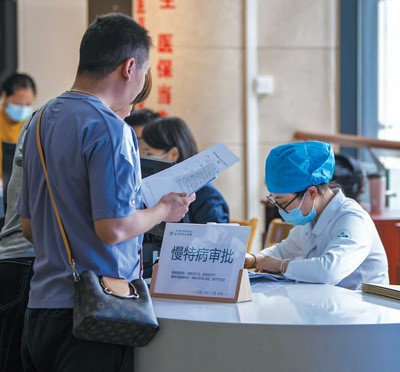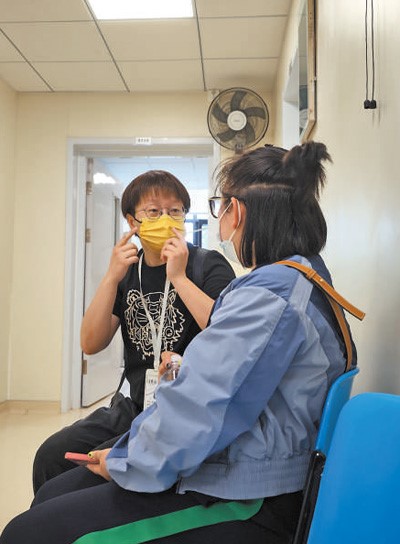[ad_1]
Professional “patient companionship”, a new occupation that mainly involves people providing companionship and support to patients during their hospital visits, has been gaining steam in China in recent years, as there has been increasing demand among people who have difficulty seeking medical services.
These “patient companions” provide services including making appointments with doctors, accompanying patients to medical appointments, helping patients consult doctors, sending test samples to labs, and picking up medical examination reports and medicines for patients.

Photo taken on May 12 shows patients going through the approval process for chronic diseases at a medical insurance service station in the outpatient lobby of Jinhua Municipal Central Hospital in Jinhua city, east China’s Zhejiang Province. (Photo/Hu Xiaofei)
Their clients are mainly people who live alone, mostly the elderly, and those who seek medical services outside of their home cities.
Qin Na, a 36-year-old woman who lives by herself, has hired a professional “patient companion” to help her father with hospital visits after she herself enjoyed the convenience provided by the service.
Qin met Zhang Ruijuan, a professional “patient companion”, through a friend’s recommendation after she was struck by acute gastroenteritis one night last year.
“The tests are often not done on the same floor, and I have to wait in line for every test. Sometimes when I feel under the weather, it’s difficult to handle these things on my own. The help of a professional ‘patient companion’ can save me from strenuous efforts and worries during the process of seeking medical services,” Qin said.
As a professional “patient companion”, Zhang can handle many things that Qin doesn’t have to do in person at the hospital.
She made an appointment with a doctor, stood in line, added information to Qin’s account of her symptoms and medical history, and took notes of the doctor’s directions for Qin. After the consultation, Zhang provided a written document for Qin, which contained detailed information on her hospital visit, including test results, doctor’s directions, and instructions for taking medicines.
Qin said Zhang’s help made the whole process very easy for her. “All I have to do is sit there and wait for my turn. I no longer have to run here and there to go through various procedures,” Qin noted.

A professional “patient companion” (left) sits with a patient during her visit to Guang’anmen Hospital under the China Academy of Chinese Medical Sciences in Beijing, China. (Photo/Yang Yanfan)
“My first experience of the services provided by a professional ‘patient companion’ was very good. Once, when my father had to go to hospital and I was too busy with work to go with him, I asked Zhang, who accompanied me on my visit to hospital, to help my father. At first, my father was reluctant to have a stranger accompany him during the process. But after he tried the services, he realized how convenient they are,” Qin told People’s Daily.
Zhang receives about 20 bookings a month. Her clients include elderly people, single, young and middle-aged people, mothers who take care of their children by themselves, and patients seeking medical services outside of their home cities, according to Zhang, who explained that most of her clients are recommended to her by people who know her.
“Some patients just like to have someone accompany them when they go to hospital, so that they feel less lonely and uneasy,” said Zhang, stressing that professional “patient companions” should have professional expertise, as they need to facilitate communication between doctors and patients and help solve practical problems for patients.
As patients who go to large hospitals in China often have to spend a lot of time waiting in lines, professional “patient companions” can meet the specific needs and resolve practical difficulties facing elderly people whose children don’t live nearby, pregnant women, people who live alone, as well as other groups who need help with visits to hospitals, said Gao Hong, deputy secretary general of the China Association of Gerontology and Geriatrics.
Professional “patient companions” should have medical common sense and legal knowledge, and be familiar with hospitals’ layouts and relevant procedures, as well as medical insurance policies, Gao said, adding that they also need to be caring, thoughtful, and patient.
The China Association of Gerontology and Geriatrics is formulating criteria and mechanisms to standardize professional activities of professional “patient companions”, in order to protect the legitimate rights and interests of both those who offer these services and consumers, according to Gao.
The association is also leveraging its advantages to hold training sessions and seminars for professionals of the emerging industry, so as to ensure its standardized and professional development, Gao added.
(Web editor: Hongyu, Liang Jun)
[ad_2]
Source link



